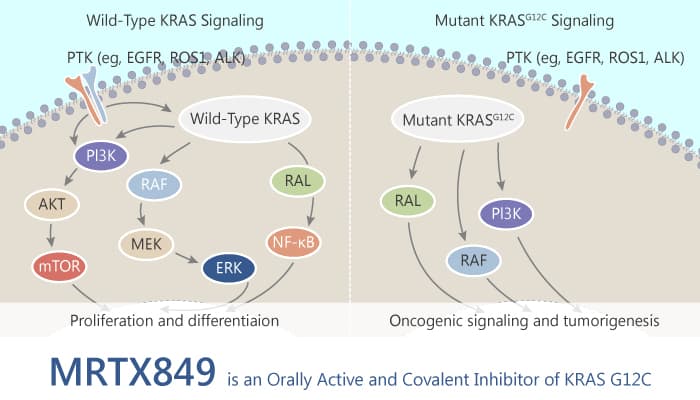KRAS mutations are the most common mutations. Especially, the KRAS oncogene encodes a binding protein that plays a crucial role in transmitting signals from extracellular growth factors to the cell nucleus. KRAS mutations occur commonly in colorectal carcinomas. KRASG12C mutations are present in lung and colon adenocarcinoma as well as smaller fractions of other cancers. MRTX849 is a potent and selective inhibitor of KRASG12C, KRAS-dependent signal transduction and cell viability in vitro.
MRTX849 is an Orally Active and Covalent Inhibitor of KRAS G12C.
It covalently binds to KRASG12C at the cysteine 12 residue, locks the protein in its inactive GDP-bound conformation, inhibits KRAS-dependent signaling and elicit anti-tumor responses in tumor models. In the KRASG12C-mutant H358 lung and MIA PaCa-2 pancreatic cancer cell lines, MRTX849 demonstrates an upward electrophoretic mobility shift of KRASG12C protein band migration by immunoblot, indicative of covalent modification of KRASG12C. MRTX849 also inhibits KRAS-dependent signaling targets including ERK1/2 phosphorylation (Thr202/Tyr204 ERK1; pERK), S6 phosphorylation (RSK-dependent Ser235/236; pS6) and expression of the ERK-regulated DUSP6. The evaluation of pERK over a time course of 48 hours indicates maximal inhibition is at 24 hours.

MRTX849 treatment in vivo leads to dose-dependent KRASG12C modification, KRAS pathway inhibition, and anti-tumor efficacy. Moreover, MRTX849 demonstrates moderate plasma clearance and prolongs half-life following oral administration. MRTX849 also demonstrates marked inhibition of ERK1/2 and S6S235/36 phosphorylation after one or three daily doses at 6 or 24 hours and levels gradually recovered by 72 hours after the final dose. Furthermore, MRTX849 demonstrates broad-spectrum tumor regression in the KRASG12C cell line and patient-derived xenograft models.
All in all, MRTX849 provides insight into the therapeutic susceptibility of KRAS mutant cancers.